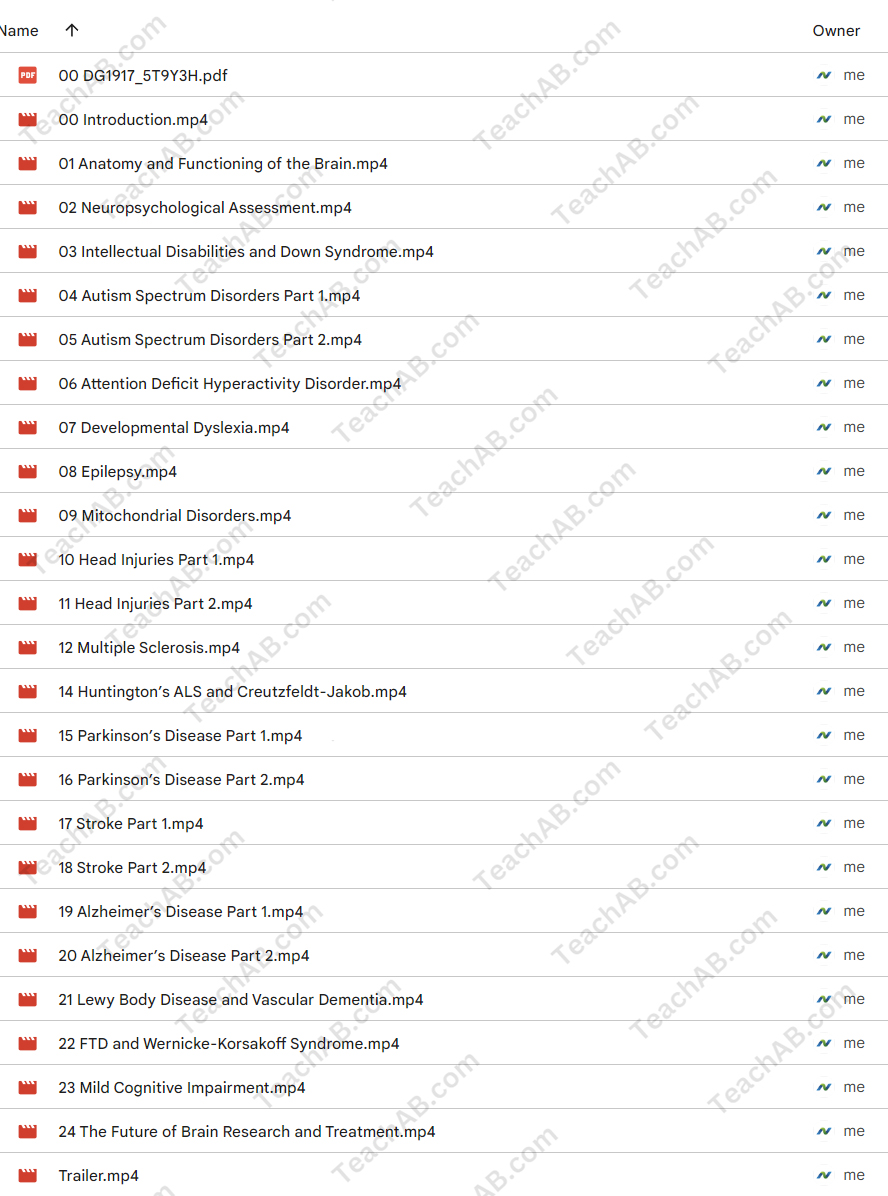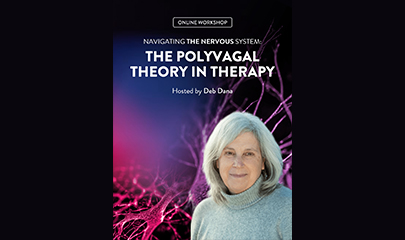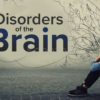Understanding Disorders of the Brain By Sandy Neargarder
$239,00 $5,00
Understanding Disorders of the Brain: A Review of Sandy Neargarder’s Insightful Course – Digital Download!
Let’s embark on a captivating adventure to uncover remarkable insights that spark your curiosity and elevate your understanding

Understanding Disorders of the Brain By Sandy Neargarder
Overview

Understanding Disorders of the Brain: A Review of Sandy Neargarder’s Insightful Course
Understanding the intricate workings of the human brain is akin to navigating a vast ocean filled with both treasures and dangers. Every wave carries stories of triumph and tragedy, reflecting the myriad of disorders that can alter our perception of reality. In her compelling lecture series, Understanding Disorders of the Brain, Professor Sandy Neargarder from Bridgewater State University invites us to dive deep into this mysterious ocean. This course spans 24 enlightening lectures, covering an extensive range of brain disorders from the well-known Alzheimer’s disease and autism to the less familiar yet equally impactful conditions like mitochondrial diseases and the neurological ramifications of head trauma. Through a structured yet engaging approach, Neargarder demystifies complex topics, equipping us with the knowledge necessary to understand and manage these disorders effectively.
The Scope and Importance of the Course
A Comprehensive Overview
The series unfolds like a well-crafted narrative, offering an overview of various brain disorders while also navigating through the underlying genetic and environmental contributors that shape these conditions. Each lecture encapsulates the essence of disorders, addressing not just the symptoms but also the intricate mechanisms at play within the brain. This holistic approach enriches our understanding, making neurological science accessible, even to those without a background in medicine. The balance between detail and engagement is key to Neargarder’s teaching style, as she weaves together stories, research findings, and real-world applications to present a vivid picture of the struggles and advancements in brain health.
Navigating Complexity with Clarity
Neargarder’s ability to convey complex medical information in an understandable manner is commendable. By simplifying difficult topics, she removes the barriers that often discourage individuals from seeking knowledge about brain disorders. Instead of feeling overwhelmed by medical jargon, listeners find themselves drawn into a narrative that encourages curiosity and compassion. The structured format of the series aids in this pursuit; each lecture builds upon the last, allowing participants to gradually expand their understanding as they delve deeper into each disorder’s specificities.
Engaging and Relevant Content
The course content is not only educational but also highly relevant to contemporary society, where mental health issues are increasingly prominent. The emphasis on awareness and understanding is particularly crucial, as knowledge can equip individuals to identify symptoms early and help reduce the stigma associated with mental health disorders. This proactive stance is akin to a lighthouse guiding ships safely through treacherous waters, representing hope and empowerment for many.
Understanding Brain Disorders: The Core Themes
Insights into Specific Disorders
Each disorder covered in the series is illuminated with rich details, intertwining scientific research with human experience. Let’s look at some significant topics:
- Alzheimer’s Disease: This lecture examines the progressive nature of Alzheimer’s, characterized by memory loss and cognitive decline. Neargarder delves into the genetic factors, such as mutations in the amyloid precursor protein, that predispose individuals to this disorder.
- Autism Spectrum Disorder: A multifaceted approach is taken to explain autism, recognizing it as a spectrum of conditions that affect social interaction and communication. The course also highlights theories regarding environmental triggers and genetic predispositions.
- Mitochondrial Diseases: These conditions, often overshadowed by more common disorders, are explored in depth. This section emphasizes the critical role that mitochondria play in energy production and how their dysfunctions lead to neurological effects.
- Neurological Effects of Head Injuries: Given the increasing attention on sports-related concussions, this lecture underscores the importance of understanding how traumatic brain injuries can lead to long-lasting cognitive impairments and behavioral changes.
Current Research and Treatments
Neargarder does not shy away from discussing the latest research developments, encouraging listeners to stay updated with emerging treatments and potential cures. For instance, she examines ongoing research into neuroprotective strategies and innovative therapies that show promise in mitigating the impact of various neurological disorders.
The incorporation of case studies and breakthroughs in neuroscience helps paint a hopeful picture for the future of brain health. By staying abreast of current advancements, we position ourselves better to make informed decisions about treatments and lifestyle adjustments.
| Disorder | Genetics | Environmental Factors | Treatments |
| Alzheimer’s Disease | APP mutations | Lifestyle factors | Cholinesterase inhibitors |
| Autism Spectrum Disorder | Multiple genes | Prenatal exposures | Behavioral therapies |
| Mitochondrial Diseases | mtDNA mutations | Nutritional deficiencies | Enzyme replacement therapies |
| Neurological Effects of Head Injuries | Acquired disorders | Concussion history | Rehabilitation therapies |
The Role of Awareness and Education
At its core, the course emphasizes that awareness and education create a foundation for understanding and managing brain disorders. Neargarder proposes that gaining knowledge about these conditions not only aids individuals in recognizing the signs in themselves and others but serves as a powerful tool for reducing stigma.
Through discussions on the societal implications of mental health and education, Professor Neargarder encourages a broader dialogue on the topic, instrumental for breaking down the barriers in treatment and care. The narrative she crafts around these disorders invokes empathy and promotes a culture of support, wherein those affected can seek help without fear or hesitation.
The Future of Brain Health: Why This Course Matters
Lifelong Learning in Neuroscience
Understanding Disorders of the Brain serves as a vital resource for anyone with an interest in psychology and neuroscience. In a world where mental health continues to be a pressing issue, this course stands out as a beacon for lifelong learning. It invites individuals to expand their horizons, fostering an informed populace that understands the importance of recognizing and addressing brain disorders.
A Resource for Diverse Audiences
The beauty of Neargarder’s lecture series lies in its accessibility to diverse audiences. Whether you are a medical student, a caregiver, or simply an inquisitive mind, the content resonates across different backgrounds. The fusion of scientific rigor with relatable storytelling ensures that the information presented is not just facts and figures, but a meaningful exploration of humanity’s experience with neurological challenges.
As we continue to unravel the mysteries of the brain through research and education, courses like this one will be instrumental in advocating for better healthcare policies, supporting research funding, and fostering community engagement.
Final Thoughts and Conclusion
In closing, Understanding Disorders of the Brain by Sandy Neargarder is more than just a collection of lectures; it’s an invitation to engage actively with the complexities of human experience. The psychological landscapes navigated throughout the course reflect resilience, struggle, and a profound commitment to understanding.
While brain disorders can feel overwhelming and daunting, Neargarder’s approach instills hope and empowers individuals with knowledge. By breaking down complexities into manageable insights, she equips us to confront these challenges with both understanding and compassion. This course is indeed a valuable addition to any lifelong learner’s library and an essential tool for anyone seeking to create a more nuanced understanding of brain health in the 21st century.
Frequently Asked Questions:
Innovation in Business Models: We use a group purchase approach that enables users to split expenses and get discounted access to well-liked courses. Despite worries regarding distribution strategies from content creators, this strategy helps people with low incomes.
Legal Aspects to Take into Account: Our operations’ legality entails several intricate considerations. There are no explicit resale restrictions mentioned at the time of purchase, even though we do not have the course developers’ express consent to redistribute their content. This uncertainty gives us the chance to offer reasonably priced instructional materials.
Quality Control: We make certain that every course resource we buy is the exact same as what the authors themselves provide. It’s crucial to realize, nevertheless, that we are not authorized suppliers. Therefore, the following are not included in our offerings: – Live coaching sessions or calls with the course author.
– Entry to groups or portals that are only available to authors.
– Participation in closed forums.
– Straightforward email assistance from the writer or their group.
Our goal is to lower the barrier to education by providing these courses on our own, without the official channels’ premium services. We value your comprehension of our distinct methodology.
Be the first to review “Understanding Disorders of the Brain By Sandy Neargarder” Cancel reply
You must be logged in to post a review.



















Reviews
There are no reviews yet.